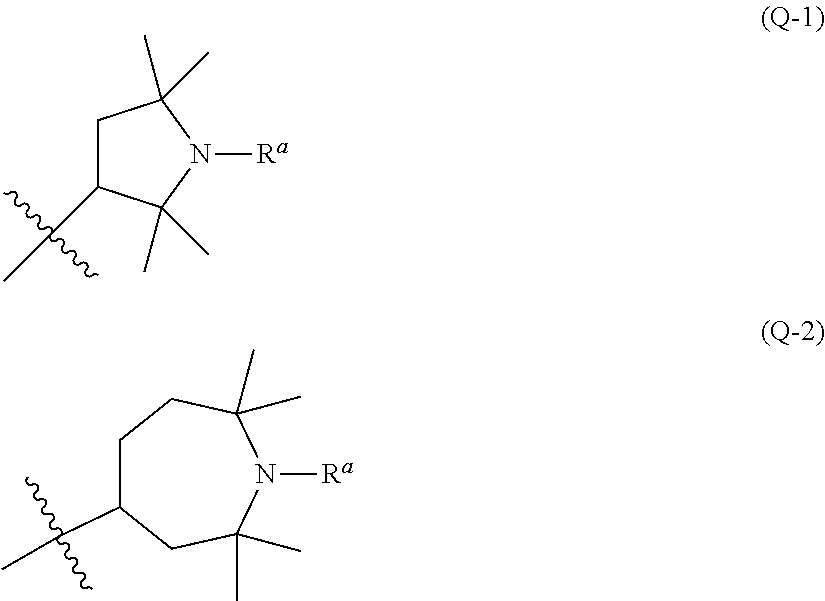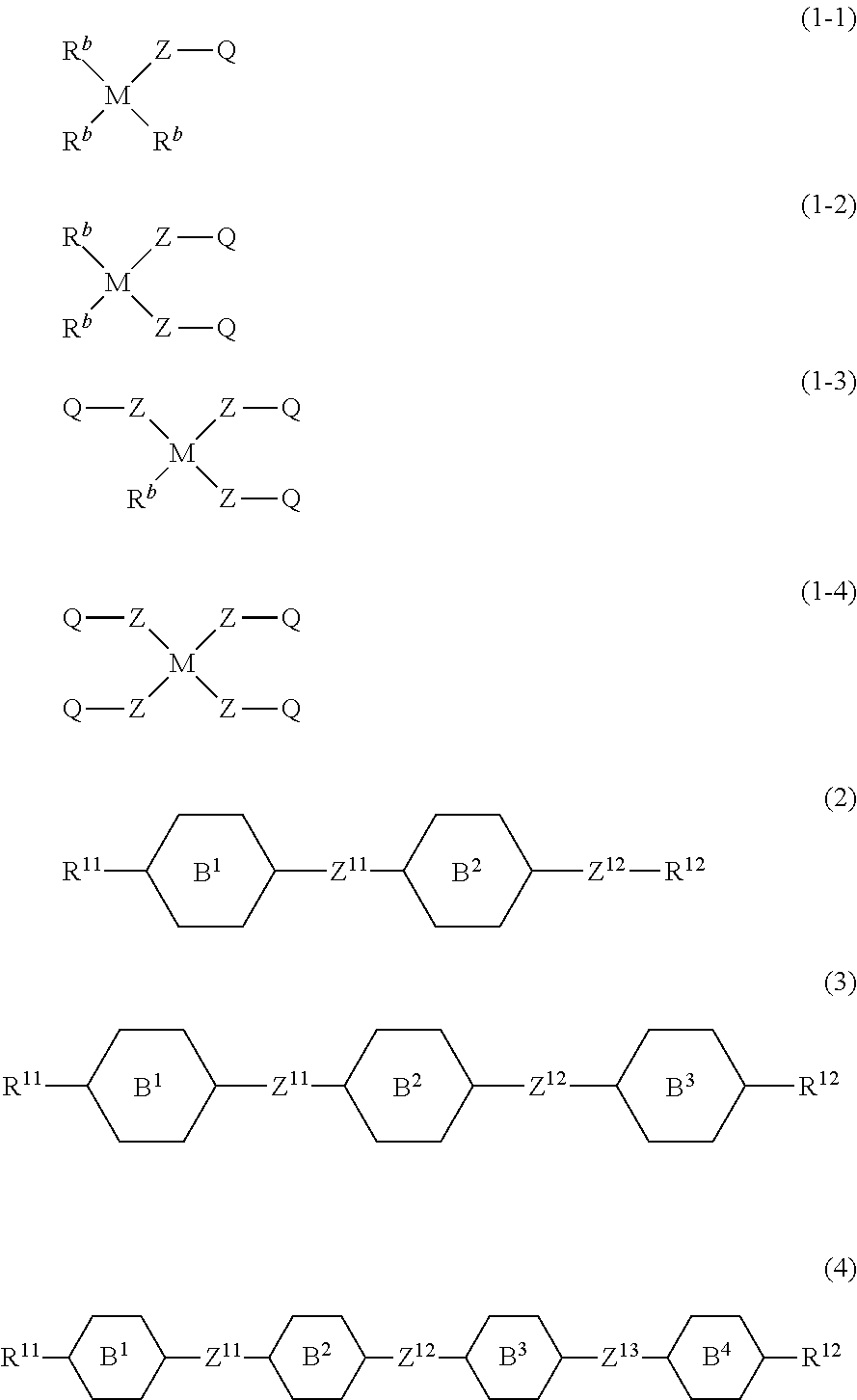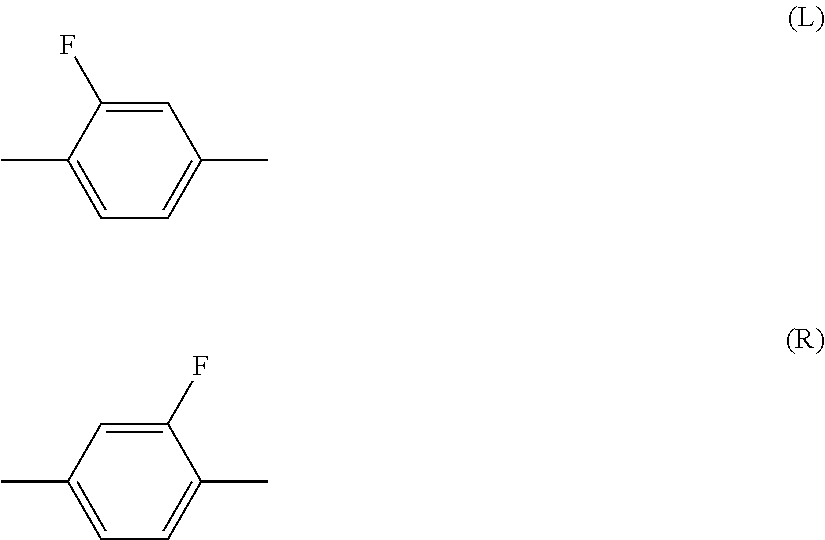Liquid crystal composition containing nitrogen-containing cyclic compound and liquid crystal display device
a liquid crystal composition and nitrogen-containing technology, applied in the field of liquid crystal compositions, can solve the problems of long service life of the device, small electric power consumption, large contrast ratio, etc., and achieve the effects of preventing photolysis, high solubility, and small viscosity
- Summary
- Abstract
- Description
- Claims
- Application Information
AI Technical Summary
Benefits of technology
Problems solved by technology
Method used
Image
Examples
example 1
Synthesis of Compound (No. 60)
[0213]
[0214]First Process:
[0215]2,2,6,6-tetramethylpiperidone (25.0 g, 0.16 mmol) and acetic acid (100 ml) were placed into a 500 ml four-necked flask under an argon gas stream, and the resultant was cooled by an ice bath. After it was confirmed that the internal temperature became 10° C. or lower, an acetic acid (70 ml) solution of bromine (18 ml, 56.1 g, 0.56 mol) was dripped in for 2 hours so that the internal temperature did not exceed 20° C. The reaction mixture was returned to room temperature, and was further stirred for 22 hours. The precipitated solid was filtered, washed with acetic acid (50 ml), water (50 ml) and ether (50 ml*2) in sequence, and dried, thereby obtaining a bromide (60-b) (57.5 g, 0.146 mol) at a yield of 91%.
[0216]Second Process:
[0217]28% ammonia water (150 ml, 2.22 mol) was placed into a 500 ml four-necked flask equipped with a mechanical stirrer, and the bromide (57.5 g, 0.146 mol) was put therein little by little under ice ...
example 2
Synthesis of Compound (No. 61)
[0225]
[0226]First Process:
[0227]2,2,6,6-tetramethylpiperidone (1.55 g, 10 mmol) and dried methylene chloride (15 ml) were added in a 200 ml four-necked flask under an argon gas stream, and the resultant was cooled by a dry-ice / acetone bath. After it was confirmed that the internal temperature became −70° C., BF3.OEt (3.3 ml, 3.73 g, 26.2 mmol) was added. After that, hexane solution (25 ml, 0.6 mol) of trimethylsilyldiazomethane was dripped in for 30 minutes. After the resultant was stirred at the same temperature for 1 hour, acetic acid (1 ml) was added. 10 minutes later, saturated NaHCO3 aqueous solution (30 g) was added, and the resultant was gradually heated to room temperature. The product was extracted with isopropyl ether (30 ml*2), and the extract was washed with saturated saline solution (20 ml*2). The water layer was concentrated and dissolved in 1N—NaOH aqueous solution (20 g), followed by extraction with ethyl acetate (30 ml*3). The combined ...
example 3
Comparison of Solubility at Low Temperature
[0233]The solubility of the compound of the invention was compared with that of a conventional compound. First of all, the following mother liquid crystal (M) was prepared. The component compounds were represented by symbols in accordance with the definitions in the later-described Table 2.
[0234]
3-HH-V(2-1)29%1-BB-3(2-8)10%3-BB(2F,3F)-O2(9-3)13%2-HH1OB(2F,3F)-O2(10-5) 20%3-HH1OB(2F,3F)-O2(10-5) 14%3-HHB-1(3-1) 8%2-BBB(2F)-5(3-8) 6%
[0235]Characteristics of the mother liquid crystal (M) were as follows. NI=74.5° C.; Δn=0.106; and Δ∈=−3.0.
[0236]Next, a low temperature storage test was carried out. The compound (No. 60) of the invention was added to the mother liquid crystal (M) in a ratio of 1000 ppm, so as to obtain a composition (X-1). 0.5 ml of the composition (X-1) and a glass capillary tube were placed into a 10 ml vial, and the vial was capped under a nitrogen gas stream. The cap portion was sealed using parafilm, and the resultant was t...
PUM
 Login to View More
Login to View More Abstract
Description
Claims
Application Information
 Login to View More
Login to View More - R&D
- Intellectual Property
- Life Sciences
- Materials
- Tech Scout
- Unparalleled Data Quality
- Higher Quality Content
- 60% Fewer Hallucinations
Browse by: Latest US Patents, China's latest patents, Technical Efficacy Thesaurus, Application Domain, Technology Topic, Popular Technical Reports.
© 2025 PatSnap. All rights reserved.Legal|Privacy policy|Modern Slavery Act Transparency Statement|Sitemap|About US| Contact US: help@patsnap.com



